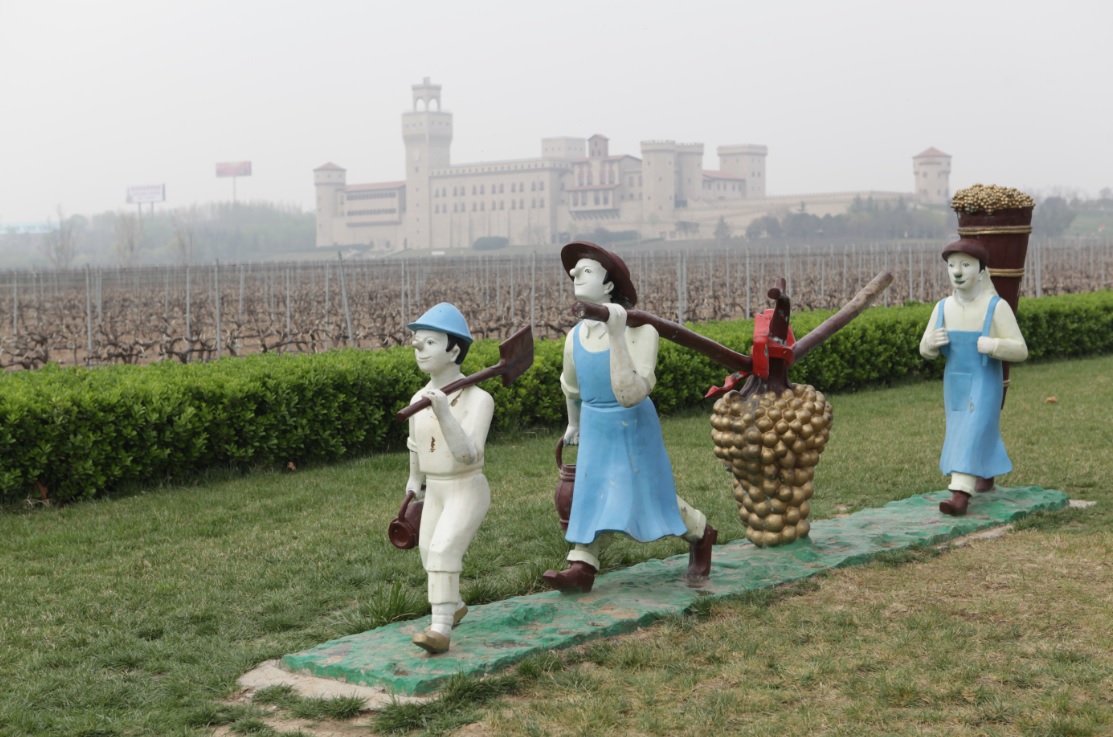
Americanisation is over
Illva Saronno, the Italian drinks producer, recently staged a business conference in China with its joint venture partner, Chinese wine producer Changyu. Christian Davis was there
__________________________________
AMERICANISATION and globalisation are over. We are now in a geo-political recession – the first since World War II, according to a leading global strategist.
Professor Ian Bremmer, president of the *Eurasia Group, was speaking at a special business conference in China, organised by Italian multinational Illva Saronno Holdings, owner of the Disaronno liqueur brand, and its partner Chinese wine producer Changyu. The event was titled Sharing Knowledge, Shaping the Future.
Bremmer, an American economist and political scientist, opened his address by saying that he was providing a roadmap to what is currently happening globally, as with the UK vote to leave the European Union and the election of Donald Trump as US president.
He said: “Why are these things happening now? They are connected, this is not a coincidence. What we have now is a geo-political recession. The geo-political environment is unwinding. It is the first since World War II, after which only the US was left standing. It rebuilt Europe and Japan and restored global order. We have been living this for decades.
“Groups such as the World Trade Organisation, the United Nations, Bretton Woods, World Bank, IMF are all about Americanisation and globalisation – liberal democracy and free markets.
“Now there is geo-political conflict. Americanisation is over and America’s role is reducing. China is rising – it is the second largest economy in the world. Within 10 years it will be the largest,” he said.
Bremmer said he believes the global economy is unravelling. Despite being a global strategist, he admitted that he was unsure as to what comes next.
“There is an absence of leadership. There is unilateralism – every country for itself. The period may last five to 10 years. There is less support for the United Nations and a weaker Europe – this is the direction we are heading in.
“In 2017 there is only one country with a global economic strategy and it is not the US, it is China. It is writing cheques for infrastructure all over the world. One belt, one road. Chinese banks are giving away more money than American banks.
“China does not want a liberal economy. It wants countries to buy from Chinese companies, not recognise Taiwan – that is the quid pro quo. It is state control, one-party rule. All of us are used to a global free market. That is going to be over. There will be some free market and some state control, something in between, such as Russia,” said Bremmer.
Bremmer cited Israel as an example of the possible way ahead for many countries. He said it is a country and regime with an effective economy, rule of law and independent judiciary. He said it no longer needs Palestinians so it has walled them off. He predicted “virtual walls” inside countries and cited Chicago’s south side and parts of Baltimore, which he said was “worse than Rwanda”. The UK has the Channel.
“If I had spoken a year ago, I would have said the geo-political recession was five to 10 years away. Since America elected Trump, it is here now,” said Bremmer.
As with tackling climate change, Bremmer said it will take a period before the growth of inequality in the world will be attended to. The growth of India and China, with emerging middle classes, is causing resentment and instability among unskilled, uneducated, white men in the US and Europe.
Bremmer said Trump was successful with this group because he recognised ‘me as a person’. A lot of Americans felt that the government was lying to them, not representing them, so they voted for someone who was not ‘one of them’.
He warned that if the symptoms are not dealt with countries can become ungovernable and fall apart, such as in Yemen and Libya, where there is no longer the ability for people to make a living and provide food.
He said strong leadership was required and Asian nations such as India, China, Indonesia and the Philippines were providing economic reform and were not corrupt. The leaders were clean and had a clear focus on execution and building of infrastructure.
*The Eurasia Group describes its “transnational practices” as “emerging markets strategy, comparative analytics, global strategy, and global macro politics – identify and assess trends and interactions across regions”.
EUROMONITOR INSIGHT
Spiros Malandrakis, research director of the market research organisation Euromonitor, told the conference, which was held at Changyu’s Reina Castle near the city of Xi’an, that, globally, people were drinking less but drinking better. The North American and Asia Pacific markets were in positive growth but Europe, while massive, was stagnant.
He pointed to the success of Prosecco in the sparkling wine sector and the premiumisation of spirits.
Blended scotch whisky was stagnating as it came under pressure from whiskies from Japan, Ireland, the US and even possibly Canada, he said. Vodka is facing maturity and is struggling in the face of the interest in gin, particularly craft gins.
He said in China wine consumption is growing faster than spirits because it is perceived as healthier with lower alcohol levels. India is also showing growth in wine and RTDs while
millennials in the US are more adventurous, looking for diversity and prepared to pay more, predicted Malandrakis.
Citing interesting new products, he chose: Bacardi’s Tang liqueur made with Chinese tea, which mixes western drinking with China’s tea drinking habit; Diageo’s Seedlip, which is a non-alcoholic drink made and looking like gin; Humboldt Finest, a cannabis-infused vodka; Spain’s Gik wine, which is coloured blue; Pernod Ricard’s Barrelhound blended scotch; and Treasury Wine Estates’ 19 Crimes, referring to the crimes in 19th-century Britain which were punishable by transportation to the then colonies, such as Australia.
STAYING INDEPENDENT
Illva Saronno Spirits’ managing director Stefano Battioni told the conference the Italian company had branches in Switzerland, Netherlands and the US. It has a turnover of €140m with its best-selling Italian liqueur brand Disaronno selling 1.6m cases and Tia Maria 400,000 cases, with other brands also in the mix. It has itself 2,300ha of vineyards and produces 15m bottles of wine.
Available in 160 countries (Europe 58%, North America 35%), the company’s aim, said Battioni, was to stay independent and expand into Asia and South America.
Bremmer's Warnings
KEY FACTORS
1 GLOBALISATION has created a lot of discontent. Over the past 20 years globalisation has taken millions of people out of poverty in China, India and emerging markets. We have a global middle class. But we have a ‘forgotten’ working class in the US and Europe.
2 MOVEMENT OF PEOPLE Millions of Syrians have fled to Europe and particularly Germany. They are not going to integrate. They are not educated so not going to contribute to the economy. In the 1980s Reagan clamped down on Mexicans coming in. The prices went up because no one was picking the fruit. So Reagan pulled back and allowed Mexicans back in.
3 TECHNOLOGY Lots of jobs are going. The inability of governments to provide jobs. Lots of people are saying: “I do not support government anymore.” Left, right, median –that is why we got Brexit and Trump.
YOUNG MARKET
Modi’s Group’s CEO Umesh Modi described the Indian market as the “youngest in the world” with 20m babies born every year. He spoke of his company’s Artic premium 100% grain vodka and Rockford, its premium branded whisky, which is made from scotch provided by William Grant & Sons, blended with Indian whisky. The Modi Group has a joint venture across the Indian sub-content with Illva Saronno.
IRISH WHISKEY
Walsh Irish Whiskey was founded in 1999 and 17 years later Augusto Reina, Illva Saronno’s CEO, invested in the company, becoming a partner. With its leading brands, The Irishman and Writers’ Tears, the company now produces 8m bottles of Irish whiskey a year.
Founder and CEO Bernard Walsh eulogised about the “Irish whiskey renaissance” with 400,000 cases in 1990, 8m last year and 24m projected for 2030 – “but still only fifth in the world behind Japanese, Canadian, American and scotch whiskies.” From six distilleries in 2015, there are projected to be 27 by 2020. He said at the moment Irish whiskey sells in just 80 countries compared to scotch in 190 and Illva Saronno in 160.
Walsh said Writers’ Tears pot still whiskey was “the Macallan of Irish whiskey” (Edrington’s Macallan is the most sought-after batch whisky at auction).
Walsh said his distillery is the sixth largest in Ireland with a 650,000 case capacity and the only Irish distillery able to produce all three styles of whiskey - malt, grain and pot still.
IN SUMMARY
Illva Saronno Holding CEO Augusto Reina concluded the conference, saying that, having started to penetrate the Indian and Chinese markets via partners the Modi Group and Changyu, the next challenge was to reshape and reposition the company in the US.
Asked by Drinks International about Changyu’s intention to buy wine producers in Australia and Chile, he said Changyu had begged him to help identify which companies are attractive and amenable to an approach. He refused to give any indication of where they are looking. He said he thought
it would be an “easy task” to sell Chinese wines abroad. Changyu dominates the domestic market and there are currently 400m wine drinkers in China. The company has plenty of potential for growth and was looking to export more, he answered.
Winery News
CHINA ON THE MARCH
Changyu is China’s largest wine producer and its new Wine City may be the largest winery in the world. Zhou Hong Jiang, Changyu’s vice president, told the audience that Changyu, founded in 1892, was China’s first wine enterprise. It was family-owned for 50 years and then became state owned from 1949 under the Communist regime. From 1997 to 2004 it became a state-owned listed company. Since 2004 Changyu has been a company of diversified shareholding with investment from China, Italy and the US. Shares are held by staff and the state: 49% of the stock is said to be listed on the Chinese stock exchange. Illva Saronno owns 33% of the remaining 51%.
It boasts 20,000ha of vineyards in six regions, 20 wineries (among them Xinjiang, Ningxia, Shaanxi, Hebei, Beijing, Liaoning and Yantai), eight ‘châteaux’, including Changyu Baron Balboa, Moser XV, Reina, Changyu AFIP, Castel, Chateau de Tinlot de Changyu and de Kayla (brandy); 29 warehouses; 3,700 sales people; 5,700 distributors; 181 winemakers. It also makes brandies, such as Changyu Koya.
The Wine City winery in Yangtai comprises 400ha of surrounding vineyards and is said to be about to produce 10 product lines and 520m bottles of wine.
Changyu bought cognac maker Roullet Fransac in October 2013, 75% of Spanish wine producer Marqués del Atrio with vineyards in Rioja, Utiel Requena, Tierra de Castilla and Navarra, in September 2015 and 90% of French château Mirefleurs in November 2015.
Hong Jiang announced that the company is looking to buy wineries in Chile and Australia as trade agreements between China and countries including Spain and Italy have opened up those markets for export and import.
Its wines are currently available in the UK through retailer Waitrose and Berry Bros & Rudd; German department store KaDeWe; Dubai hotel Burj Al Arab and on some cruise lines, the French Carrefour and Spanish El Cortes Ingles retail chains. Hong Jiang says the company wishes to consolidate and improve sales in the face of fierce competition from the likes of France, Italy and Spain. Dominant in China, it wishes 30% of sales to be export.
Changyu may well be the largest wine producer in the world and may have the largest winery in the word. Either way, expect to see Chinese wines on lists and shelves any time soon.
